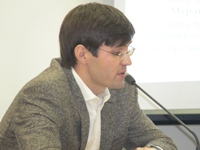Registration
You will receive an email confirming your registration.
IMGXYZ3326IMGZYXIn 2002, the Justice and Development Party (AKP) came to power in Turkey and its leader, Recep Tayyip Erdoğan became the new prime minister. Since then, domestic and international observers have found the party’s policies ambiguous at best, and they have questioned Turkey’s development path, the future of democracy in the country, and the direction of Turkey’s foreign policy. Pavel Shlykov of the Moscow State University’s Institute of Asian and African Studies and of the International Committee for Pre-Ottoman and Ottoman Studies (CIÉPO) spoke about the current political situation in Turkey at an event hosted by the Carnegie Moscow Center. Carnegie’s Alexey Malashenko moderated.
Justice and Development Party: 9 Years in Power
- An ambiguous course: The AKP’s nine years in power so far have clearly demonstrated a contradictory political strategy and practice, Shlykov said. He suggested that the party seeks to “pull Turkey up to the European level” through administrative and political reform in line with the Copenhagen criteria, which are a condition for joining the EU. It has also carried out some relatively successful economic reforms and achieved economic stability. However, at the same time, the AKP has presided over a retreat from the principles of liberal democracy, increasing repression against political opponents and the country’s Islamicization, Shlykov added.
- Broad public support: Shlykov said that the party can afford to take some controversial and ambiguous steps thanks to the broad public support base it enjoys and active support from voters. Voters support the party because it fits with their own political and ideological preferences, sparked by a society-wide turn toward religiousness and a decline in tolerance. Shlykov noted that although living standards are rising, Turkish society is growing ever more conservative.
Islamicization
Islam has considerably increased its influence in Turkey since the AKP came to power, said Shlykov, although he noted that religion had been growing in influence in the state since the 1970s.
- The Islamic discourse: The AKP is attempting to bring subjects of general interest to Islamists into the social and political discourse, including issues such as wearing the hijab in public places, Shlykov said.
- Islamic personnel policy: When choosing people for administrative posts, from municipal heads to the directors of schools and institutes, preference increasingly goes to those with links to the tariqats, or Islamic brotherhoods, Shlykov added.
- Religious civil servants: The number of bureaucrats, such as overseers and inspectors, whose duties are in some way linked to religion, is growing all the time, Shlykov said. This army of religious civil servants is financed and managed by the state. The civil servants in question base their activity on the principles of Turkish Islamism, a Turkic-Islamic synthesis based on Sunni Islam, marginalizing non-Sunni religious currents and aiming for the homogenization of society, he concluded.
- A pro-Islamic economy: By the 1980s, Turkey saw the rapid growth of a new class of small provincial entrepreneurs, whose businesses quickly grew in size. Shlykov said the Islamists and tariqats were closely linked to these rising business circles, getting financial support from them and recruiting people from among them. Islamic business has continued to grow and consolidate, and the AKP’s policies of monetization and privatization of state-owned enterprises—whose assets, worth $28 billion, were transferred to the private sector between 2002 and 2008—have created friendly conditions for the development of Islamic business.
- Public organizations: When the state stepped back from control of the economy and some aspects of the social sector, it created a favorable environment for religious movements and the various Islamic groups, Shlykov said. They have moved in to fill this vacuum, particularly in education and healthcare. One such organization is Fethullah Gulen’s Islamist movement, whose broad popularity in the society enables the AKP to deflect accusations of state-imposed Islamization. But in Shlykov’s opinion, Gulen’s movement is in many ways a product for foreign consumption: Gulen’s appeals for tolerance and inter-cultural dialogue meet with a welcome reception in Western countries. Shlykov explained that some experts believe that the movement’s real aim is to gain influence in Turkish public life, dominate the country’s social sphere, and train people to enter the current system’s institutions and eventually bring them under their control.
Revision of Civilian-Military Relations
- Decline in the army’s role: The army, which was always a major political player in Turkey and had previously guaranteed that the country stayed on its democratic and secular development track, is now losing its political independence and being brought ever more under the control of the civilian authorities and political leadership, Shlykov said. The AKP has pursued a policy of replacing inconvenient military personnel with new people ready to work with the party. He offered as an example the mass resignation of the entire senior staff of Turkey’s army in the summer of 2011.
- From military to civilian coups: A military coup that could change the country’s development track looks impossible in today’s Turkey, Shlykov said. He argued that “Turkey has gone from military coups to civilian ones.” The election of Islamist Abdullah Gül’s as president in 2007 could be seen as the first civilian coup, he added, and the ruling party’s offensive against the army is the second.
Foreign Policy
Some big foreign policy changes have taken place since AKP came to power, Shlykov said. The party is trying to move away from a pro-Western course and instead trying to build its foreign policy around Turkey’s short-term interests, as the AKP understands them, he said. Consequently, there has been growing sympathy for Turkey in the Arab world of late.
